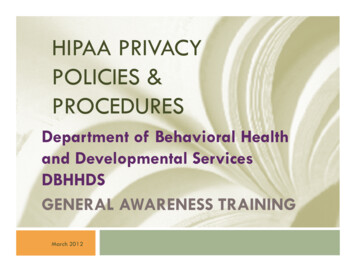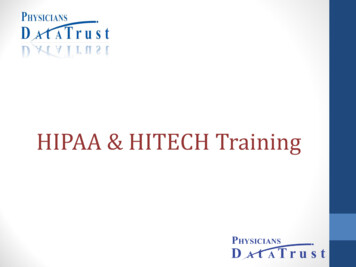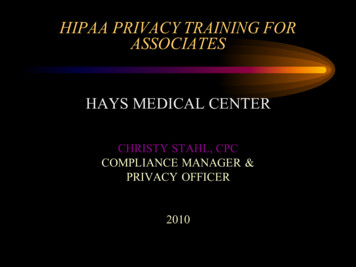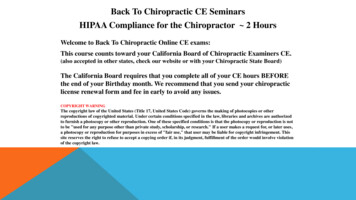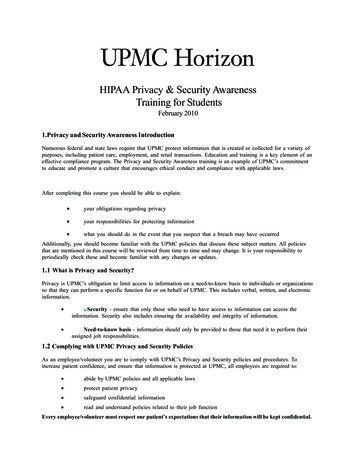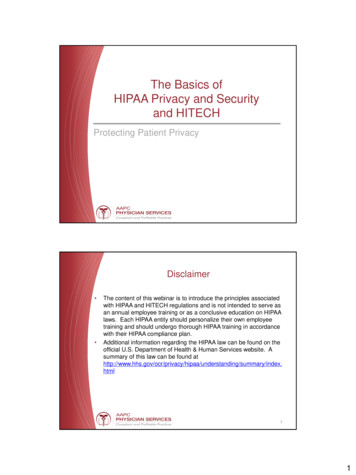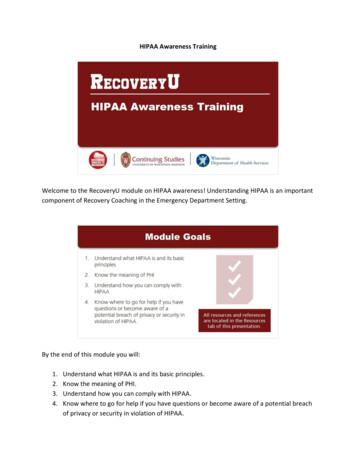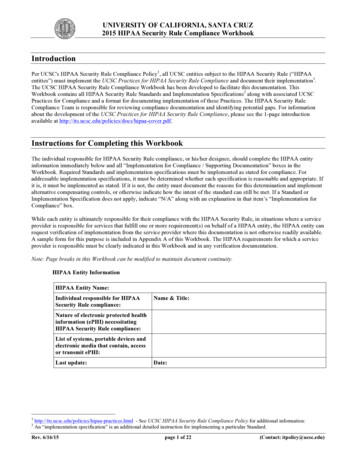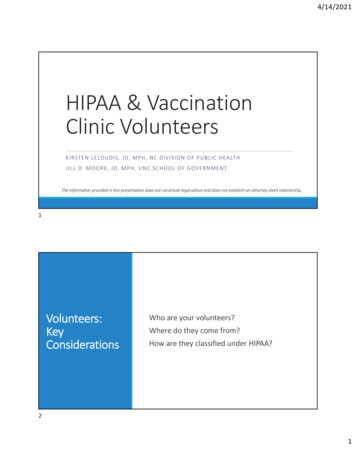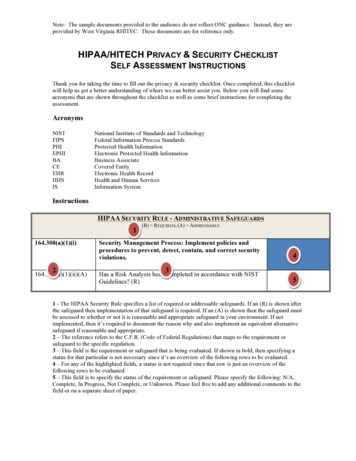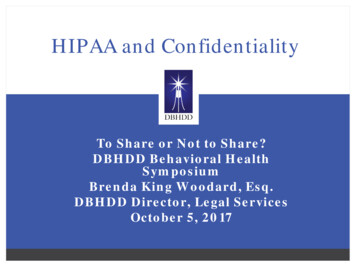
Transcription
HIPAA and ConfidentialityTo Share or Not to Share?DBHDD Behavioral HealthSymposiumBrenda King Woodard, Esq.DBHDD Director, Legal ServicesOctober 5, 2017
Disclaimer This presentation does not constitute legal advice. Providers should seek their own legal advice from theirown attorneys on these subjects. DBHDD Policies and forms are available for yourreview at DBHDD PolicyStat:https://gadbhdd.policystat.com/ You are welcome to copy DBHDD policies, but DBHDDdoes not guarantee that they will ensure yourcompliance with all laws applicable to you or yourcircumstances!Georgia Department of Behavioral Health and Developmental Disabilities2
Topics for Presentation HIPAA Georgia laws regarding protected healthinformation Substance Use federal laws regarding protectedhealth information Risk Prevention SanctionsGeorgia Department of Behavioral Health and Developmental Disabilities3
HIPAASECTION OVERVIEWWHAT IS HIPAAHIPAA BASICSGeorgia Department of Behavioral Health and Developmental Disabilities4
WHAT IS HIPAA? HIPAA, or the Health Insurance Portability andAccountability Act of 1996 United States legislation that provides data privacyand security provisions for safeguarding medicalinformation Gives patients more control over their healthinformation Sets boundaries on the use and release of healthrecordsGeorgia Department of Behavioral Health and Developmental Disabilities5
HIPAA Basics: Covered Entities Those who must comply with HIPAA are often called HIPAA covered entitiesCovered entity means:A health plan,A health care clearinghouse, ORA health care provider who transmits any health informationin electronic form in connection with a covered transaction(such as electronic billing and fund transfers) KNOW whether you are a Covered Entity and whether HIPAAapplies to you!45 C.F.R. § 160.103Georgia Department of Behavioral Health and Developmental Disabilities6
HIPAA Basics: Covered Entities For HIPAA purposes, health plans include: Health insurance companies HMOs, or health maintenance organizations Employer-sponsored health plans Government programs that pay for health care, likeMedicare, Medicaid, and military and veterans’ healthprogramsGeorgia Department of Behavioral Health and Developmental Disabilities7
HIPAA Basics: Covered Entities For HIPAA purposes, Clearinghouses areorganizations that process nonstandard healthinformation to conform to standards for data contentor format, or vice versa, on behalf of otherorganizations Examples include a repricing company billing service,community health management information system,community health information systemGeorgia Department of Behavioral Health and Developmental Disabilities8
HIPAA Basics: Covered Entities Providers who submit HIPAA transactions, like claims,electronically are covered entities and include but arenot limited to: rsing homesPharmaciesGeorgia Department of Behavioral Health and Developmental Disabilities9
HIPAA Basics: Confidentiality and HIPAAConfidential:The property that data or information is private and is notmade available or disclosed to persons who are not authorizedto access such data or information. 45 C.F.R. § 164.304HIPAA-speak: “Protected Health Information (PHI)”Protected health information means individually identifiable healthinformation 45 C.F.R. § 160.103See DBHDD Policy 23-100 “Confidentiality and HIPAA”Georgia Department of Behavioral Health and Developmental Disabilities10
HIPAA Basics: Identifying IndividualsHIPAA says that protected health information (PHI) isconfidential when it identifies: The individual The individual’s relatives The individual’s employers OR The individual’s household members45 C.F.R. § 164.514(b)(2)(i)Georgia Department of Behavioral Health and Developmental Disabilities11
HIPAA Basics: Confidentiality and HIPAAALL information about individuals isconfidential regardless of the format!! Clinical and billing records Letters, documents Conversations E-mails Text messages Voice mail messages45 C.F.R. § 160.103Georgia Department of Behavioral Health and Developmental Disabilities12
HIPAA Basics: Confidentiality and HIPAADisclosure – The release, transfer, provision ofaccess to, or divulging in any other manner ofinformation outside the entity holding theinformationDisclosure includes: affirmative verification of another person'scommunication communication of any information on an identifiedindividual45 C.F.R. § 160.103Georgia Department of Behavioral Health and Developmental Disabilities13
HIPAA Basics: Identifying IndividualsIf someone is requesting PHI but is not authorized toaccess PHI, and you know that the person hasinformation about the individual, you can’t disclosePHI to that person if they could: Use what they know To “make a match” and identify the individual.45 C.F.R. § 164.514(b)(2)(ii)Examples: People you know in the community already “Common acquaintances” of people you knowGeorgia Department of Behavioral Health and Developmental Disabilities14
HIPAA Basics: Minimum Necessary Rule Staff who do not have duties regarding an individualshould not have access to the individual’s PHI When staff use or disclose PHI, they shoulduse/disclose only the minimum PHI that is necessaryto accomplish the purpose for which the use ordisclosure is being made When providing treatment, the minimum necessaryrule does not apply45 C.F.R. §§ 164.502(b), 164.514(d).Georgia Department of Behavioral Health and Developmental Disabilities15
HIPAA Basics: Does HIPAA Apply The general standard: if a state law oranother law is more protective of thepatient, then it takes precedence overHIPAA If you are not sure, ask your attorney forguidance!Georgia Department of Behavioral Health and Developmental Disabilities16
HIPAA Basics: Additional RulesHIPAA also includes rules on: Confidentiality of Genetic Information Fundraising, Marketing and PHI Research and PHI Sale of PHI Document RetentionGeorgia Department of Behavioral Health and Developmental Disabilities17
GEORGIA LAWSSECTION OVERVIEWCONFIDENTIALITY OF MH AND DD PHILAWFUL DISCLOSURESPRIVILEGED COMMUNICATIONSDISCLOSURESGeorgia Department of Behavioral Health and Developmental Disabilities18
Georgia Laws: Mental Health andDevelopmental Disabilities RecordsConfidentiality of mental health and developmental disabilitiesinformation:All information about individuals, whether oral or written and regardlessof the form or location in which it is maintained, is confidential andmay be disclosed only: When the individual (or another person authorized to do so) giveswritten consent, OR When the law specifically authorizes disclosureO.C.G.A. §§ 37-3-166 and 37-4-125DBHDD Policy 23-100, “Confidentiality and HIPAA”Georgia Department of Behavioral Health and Developmental Disabilities19
Georgia Laws: Lawful DisclosuresGeorgia law authorizes disclosures of mental health anddevelopmental disability records: To physicians or psychologists for continuity of care To clinicians in a bona fide medical emergency To the guardian or health care agent of an individual, orparent or legal custodian of a minor To the individual’s attorney, if authorized, AND ifrequested, at a hearing held under the Mental Health CodeGeorgia Department of Behavioral Health and Developmental Disabilities20
Georgia Laws: Lawful Disclosures For records of a deceased individual, to the administratoror executor of the estate AND in response to a subpoena bythe coroner or medical examiner, EXCEPT for privilegedinformation For crimes alleged to occur on program premises, lawenforcement may obtain circumstances of the incident andmay be told whether an accused individual washospitalized, and the individual’s name, address and lastknown whereabouts For crimes elsewhere, law enforcement may be toldwhether an individual has been hospitalized, and obtain thelast known address of the individualGeorgia Department of Behavioral Health and Developmental Disabilities21
Georgia Laws: Lawful Disclosures Upon request and upon authorization by theindividual, notice of discharge of an adult involuntaryindividual may be given to the sheriff who transportedthe individual for evaluation In response to a valid subpoena or court order of acourt of competent jurisdiction, EXCEPT for privilegedinformationGeorgia Department of Behavioral Health and Developmental Disabilities22
Georgia Laws: Lawful Disclosures Ask your attorney about Georgia law, especiallyregarding court orders and subpoenas fordisclosure of PHI HIPAA requires notice to the individual if PHI issubpoenaed, or a “qualified protective order” The individual may not have a way of knowing thathis/her PHI is being sought in a lawsuit It may be advisable for an attorney to file a motionor take other legal action on behalf of the coveredentityGeorgia Department of Behavioral Health and Developmental Disabilities23
Georgia Laws: Privileged CommunicationsIndividuals have a privilege to keep confidential thecommunications they make to their: Psychiatrist Licensed psychologist LCSW Clinical nurse specialist in psychiatric/mental health Licensed marriage and family therapist Licensed professional counselorO.C.G.A. § 24-5-501, and § 43-39-16 for licensedpsychologistsGeorgia Department of Behavioral Health and Developmental Disabilities24
Georgia Laws: Privileged CommunicationsAdditionally, communications between certainhealthcare professionals who are providing/haveprovided psychotherapy to the individual, may beprivileged Only between the listed healthcare professionals With a relationship to the individual Regarding communications that are alreadyprivilegedO.C.G.A. § 24-5-501(a)(8)Georgia Department of Behavioral Health and Developmental Disabilities25
Georgia Laws: Privileged CommunicationsFor the purposes of privilege, “psychotherapy” meansproviding psychotherapeutic techniques:"Psychotherapeutic techniques" means those specifictechniques involving the in-depth exploration andtreatment of interpersonal and intrapersonal dynamics butshall not include the performance of those activitiesexclusively reserved to any other business or profession byany other chapter of [the Georgia professional code]O.C.G.A. §§ 24-5-501(b); 43-10A-3(11)Georgia Department of Behavioral Health and Developmental Disabilities26
Georgia Laws: Privileged CommunicationsWhen confidential mental health, developmental disabilities, oralcohol and drug abuse information CAN be disclosed to thefollowing persons, Georgia law still prohibits disclosure to themof privileged communications that may be in the records.Privileged communications cannot be disclosed to: Coroners and medical examiners Executors and administrators of a deceased individual’s estate Recipients of records via court order or subpoenaO.C.G.A. §§ 37-3-166, 37-4-125, 37-7-166Georgia Department of Behavioral Health and Developmental Disabilities27
Georgia Laws: Privileged Communications Privileged communications cannot be disclosed ina lawsuit The individual can WAIVE the privilege The healthcare professional/facility cannot waivethe privilege The privilege extends past the individual’s death,and does not “die” with the individualGeorgia Department of Behavioral Health and Developmental Disabilities28
Georgia Laws: Privileged CommunicationsIf an individual is making threats to harm someone: The provider’s first duty is to keep or make the individualsecure, as appropriate under the law. Is involuntarystatus possible (danger to self or others)? Can theprovider prevent an unsafe discharge? Does the treatment team know about the threat? Should the threat be disclosed? All facts must be consideredLaw in Georgia is not clearDBHDD assumes that it is NOT okay to make a disclosureContact your attorney to gather and discuss all the facts, and todefine your policy!Georgia Department of Behavioral Health and Developmental Disabilities29
Georgia Laws: Authorization to DisclosePHI and Privileged CommunicationsAn individual may authorize in writing for his/herPHI, including privileged communications, to bedisclosed to a named person or facility Does the individual have the mental “capacity” toauthorize the disclosure? Capacity means understanding what you are doing and theconsequences of what you are doingDoes the individual know what he/she is doing when he/shesigns an authorizationIn DBHDD, the physician/treatment team determines whetheran individual has capacity to sign an authorization to disclosePHIGeorgia Department of Behavioral Health and Developmental Disabilities30
Georgia Laws: Disclosures of Confidential PHIAfter a disclosure is made:The information is still confidential!A disclosure to Ms. Q that is valid under the lawdoes not authorize disclosure to Mr. B, C, or D.O.C.G.A. §§ 37-3-166(c), 37-4-125(c), 37-7-166(c)Georgia Department of Behavioral Health and Developmental Disabilities31
Scenario: Callers Seeking PHIMaggie is a patient who is currently in a state hospitalreceiving treatment for mental illness. Worried aboutMaggie, Maggie’s sister, Sarah, calls DBHDD asking ifher sister is currently receiving services.Is it appropriate for DBHDD to simply inform Sarahthat Maggie is in fact receiving treatment, as long as noother information is disclosed?Georgia Department of Behavioral Health and Developmental Disabilities32
Scenario: Callers Seeking PHIAnswer:No. Because all information about individualsis confidential, DBHDD does not confirm ordeny to a member of the public whether anindividual is receiving or has receivedtreatment or services.Georgia Department of Behavioral Health and Developmental Disabilities33
Scenario: Callers Seeking PHIDBHDD training says that if an individual’s family/friendscall: DBHDD staff say they cannot confirm or deny anythingabout an individual, even whether they are at the hospitalor not. Staff politely end the conversation, hang up, and ask theindividual: If he/she wants to authorize the disclosure, or If he/she will make a call back to the family/friend.O.C.G.A. §§ 37-3-166, 37-4-125, 37-7-166Georgia Department of Behavioral Health and Developmental Disabilities34
SUBSTANCE USE FEDERAL LAWSSECTION OVERVIEWSUBSTANCE USE REGULATIONSRECENT CHANGES TO SAMHSA REGULATIONSGeorgia Department of Behavioral Health and Developmental Disabilities35
Federal Regulations: Confidentiality ofSubstance Use Disorder Patient RecordsRecords and information identifying anindividual as having a substance use disorderare confidential, and cannot be disclosedwithout: Written consent of the individual (or a personauthorized to give consent), OR Specific authority in the regulations. Substance use records CANNOT be produced inresponse to a subpoena!42 C.F.R. Part 2Georgia Department of Behavioral Health and Developmental Disabilities36
Federal Regulations: Confidentiality ofSubstance Use Disorder Patient Records“Identifying an Individual”:Substance use information Georgia Department of Behavioral Health and Developmental Disabilitiesmay incriminate!37
Federal Regulations: Confidentiality ofSubstance Use Disorder Patient RecordsSubstance use disorder records which areproduced on the individual’s authorizationmust bear notice to the recipient concerningrestrictions on further use or disclosure by therecipientGeorgia Department of Behavioral Health and Developmental Disabilities38
Federal Regulations: Confidentiality ofSubstance Use Disorder Patient RecordsCONFIDENTIAL AND PRIVILEGEDThis information has been disclosed to you from records protected byfederal confidentiality rules (42 CFR part 2). The federal rules prohibit youfrom making any further disclosure of information in this record thatidentifies a patient as having or having had a substance use disorder eitherdirectly, by reference to publicly available information, or throughverification of such identification by another person unless furtherdisclosure is expressly permitted by the written consent of the individualwhose information is being disclosed or as otherwise permitted by 42 CFRpart 2. A general authorization for the release of medical or otherinformation is NOT sufficient for this purpose. The federal rules restrictany use of the information to investigate or prosecute with regard to acrime any patient with a substance use disorder, except as provided at§§ 2.12(c)(5) and 2.65.42 C.F.R. § 2.32 (emphasis added)Georgia Department of Behavioral Health and Developmental Disabilities39
Recent Changes to SAMHSA Regulations: 42C.F.R. part 2 Reports of Violations (§ 2.4) reporting a violation of these regulationsby methadone programs (now referred to as opioid treatment programs) isnow to be reported to the Food and Drug Administration (FDA) Confidentiality Restrictions and Safeguards (§ 2.13) has a newrequirement that, upon request, patients who have included a generaldesignation in the ‘‘To Whom’’ section of their consent form must beprovided a list of entities (referred to as a List of Disclosures) to which theirinformation has been disclosed pursuant to the general designation Security for Records (§ 2.16) clarifies that this section requires bothpart 2 programs and other lawful holders of patient identifying informationto have in place formal policies and procedures addressing security,including sanitization of associated media, for both paper and electronicrecordsGeorgia Department of Behavioral Health and Developmental Disabilities40
Recent Changes to SAMHSA Regulations: 42C.F.R. part 2 Disposition of Records by Discontinued Programs (§ 2.19) addressesboth paper and electronic records. SAMHSA also added requirements forsanitizing associated media. Notice to Patients of Federal Confidentiality Requirements (§ 2.22)SAMHSA clarifies that the written summary of federal law and regulations maybe provided to patients in either paper or electronic format. SAMHSA alsorevised § 2.22 to require the statement regarding the reporting of violationsinclude contact information for the appropriate authorities. Consent Requirements (§ 2.31) permits, in certain circumstances, a patientto include a general designation in the ‘‘To Whom’’ section of the consent form,in conjunction with requirements that the consent form include an explicitdescription of the amount and kind of substance use disorder treatmentinformation that may be disclosed. SAMHSA also revised § 2.31 to require thepart 2 program or other lawful holder of patient identifying information toinclude a statement on the consent form when using a general designation in the‘‘To Whom’’ section of the consent form that patients have a right to obtain, uponrequest, a list of entities to which their information has been disclosed pursuantto the general designation. SAMHSA also revised § 2.31 to permit electronicsignatures to the extent that they are not prohibited by any applicable law.Georgia Department of Behavioral Health and Developmental Disabilities41
Recent Changes to SAMHSA Regulations: 42C.F.R. part 2 Prohibition on Re-disclosure (§ 2.32) SAMHSA clarifiesthat the prohibition on re-disclosure only applies toinformation that would identify, directly or indirectly, anindividual as having been diagnosed, treated, or referred fortreatment for a substance use disorder, such as indicatedthrough standard medical codes, descriptive language, orboth, and allows other health-related information shared bythe part 2 program to be re-disclosed, if permissible underother applicable laws. Medical Emergencies (§ 2.51) revises the medicalemergency exception to make it consistent with the statutorylanguage and to give providers more discretion to determinewhen a ‘‘bona fide medical emergency’’ exists.Georgia Department of Behavioral Health and Developmental Disabilities42
Recent Changes to SAMHSA Regulations: 42C.F.R. part 2 Research (§ 2.52) SAMHSA revises the research exception to permit dataprotected by 42 CFR part 2 to be disclosed to qualified personnel for thepurpose of conducting research by a part 2 program or any other individualor entity that is in lawful possession of part 2 data if the researcherprovides documentation of meeting certain requirements related to existingprotections for human research. SAMHSA also revised § 2.52 to addressdata linkages to enable researchers holding part 2 data to obtain linkages toother datasets, provided that appropriate safeguards are in place. Audit and Evaluation (§ 2.53) the update modernizes the requirementsto include provisions governing both paper and electronic patient records.SAMHSA also revised § 2.53 to permit an audit or necessary evaluation tomeet the requirements of a Centers for Medicare & Medicaid Services(CMS)-regulated accountable care organization (CMS-regulated ACO) orsimilar CMS-regulated organization (including a CMS-regulated QualifiedEntity (QE)), under certain conditions.Georgia Department of Behavioral Health and Developmental Disabilities43
REVIEWLaws in order of protection of patients1. Federal Law - Confidentiality of Substance UseDisorder Patient Records, 42 C.F.R. Part 22. Georgia laws - confidentiality for mental illness,developmental disabilities and addictive disease3. Health Insurance Portability andAccountability Act of 1996 (HIPAA)Georgia Department of Behavioral Health and Developmental Disabilities44
Scenario: Applying PHI RulesSam, a patient at XYZ Drug Treatment Program, isinvolved in a major heroin distribution ring and hasbeen distributing drugs to other patients.Can Sam’s program tell the police and releaseinformation to the prosecutor?Georgia Department of Behavioral Health and Developmental Disabilities45
Scenario: Applying PHI RulesAnswerYes. Both the HIPAA Privacy Rule (§164.152(f)(5),(6))and 42 CFR part 2 (§2.12(c)(5)) allow a program toreport patient crimes on its premises to lawenforcement.Georgia Department of Behavioral Health and Developmental Disabilities46
RISK PREVENTIONSECTION OVERVIEWSECURITYCOMMON MISTAKESGeorgia Department of Behavioral Health and Developmental Disabilities47
Risk Prevention: Security“Security” under HIPAA includes: Physical security of PHI Electronic security of PHI45 C.F.R. §§ 164.302 et seq.Georgia Department of Behavioral Health and Developmental Disabilities48
Risk Prevention: Physical Security Does provider policy require shredding paper PHI before disposal?Are there locked recycling/trash bins for paper PHI?Does the provider have means of shredding or wipingelectronic devices?Are photocopiers and scanners wiped before returningto the leasing company, or before disposal?Do you have occasion to deliver paper PHI, and is it“secure in transmission”?Georgia Department of Behavioral Health and Developmental Disabilities49
Risk Prevention: Physical Security What devices are staff allowed to use? Does thatinclude their personal devices? (BYOD policies) What policies do you have on physical security fordevices? Are staff allowed to remove them from theworkplace? Is the workplace physically secure, to protectdevices? Are staff trained to not store passwords on stickynotes attached to the electronic device or nearby?Georgia Department of Behavioral Health and Developmental Disabilities50
Risk Prevention: Physical Security Do you have a clean desk practice? Unless you have an office with a door that you lock Can you clear your desk of documents containing PHI before you leavework? Do you maintain PHI under lock and key? Do you assign someone to monitor fax machines, copiersand meeting rooms for uncollected PHI? When discussing PHI, are there other individuals, visitors,or any unauthorized persons within earshot?Georgia Department of Behavioral Health and Developmental Disabilities51
Risk Prevention: Electronic Security Is there a business e-mail account that all staff arerequired to use? Or are they using personal e-mailaccounts (gmail, yahoo, hotmail, etc.)? Is there an on-boarding and off-boarding process forhiring, internal transfers, and termination of staffaccounts? Can accounts be audited? Same principles apply to databases and otherelectronic PHIGeorgia Department of Behavioral Health and Developmental Disabilities52
Risk Prevention: Electronic SecurityConsider whether your electronic storage of PHI is secure Is the device/account password protected? Is a password stored on or near the device? Is there PHI on the desktop, immediately accessible? Is PHI in the “Notes” section of a smart phone? If PHI is in an app or web-based portal, is the app/portalsecure (password protected, etc.)? Consider establishing direct access to your network viaVPN when operating remotely, for secure access to e-PHIGeorgia Department of Behavioral Health and Developmental Disabilities53
Risk Prevention: Electronic Security Is everyone in your Contacts or Address Book authorized to receive PHI?CHECK to see if all recipients are authorized to receivethe PHI you are sendingCHECK to see if there is PHI in the previous e-mailchain or attachments that others may have includedCHECK to see if you have the correct name andaddress for all recipientsHave a process in place to correct mis-delivered emailsGeorgia Department of Behavioral Health and Developmental Disabilities54
Risk Prevention: Common MistakesWhat are your procedures to check and re-checkidentities in documenting and in disclosing PHI?Georgia Department of Behavioral Health and Developmental Disabilities55
Risk Prevention: Common MistakesHIPAA requires that the covered entity verify theidentity of a caller or person requesting PHI. When leaving phone messages, are staff disclosing PHIto whoever picks up the message? How do you verify the caller’s identity? Do you obtain evidence that the provider has atreatment relationship with the individual?45 C.F.R. §§ 164.514(h), 164.506(c). O.C.G.A. §37-3166(a)(3)Georgia Department of Behavioral Health and Developmental Disabilities56
Risk Prevention: Common Mistakes Did you check the authorization and the address ofthe person to whom you are mailing documents? Did you check documents before you gave them toan individual - does the PHI belong to them? Did you check all details of e-mails (identity,authorization, addresses, etc.) before hitting“send”? Did you verify the identity of the person who iscalling or visiting?Georgia Department of Behavioral Health and Developmental Disabilities57
Risk Prevention: Common MistakesCertain information may need special authorization or legalbasis for disclosure (alcohol or drug records, HIV/AIDS,privileged communications)Consider the options if no authorization is obtained: Redact on paper (black out or white out) if necessary This includes pixelating photos and videos to obscure thefacial or other identity of an individual Redact alcohol and drug information from mental healthrecords, as needed, as well as HIV/AIDS informationGeorgia Department of Behavioral Health and Developmental Disabilities58
Risk Prevention: Common MistakesBe Smart with Redaction!It is not enough to highlight text in black or cover theinformation with a colored rectangle. These methods work forhard copy documents, but they are not appropriate forelectronic documents. To remove the information, you should“flatten” the file by converting to TIFF images.Georgia Department of Behavioral Health and Developmental Disabilities59
Risk Prevention: Common MistakesGeorgia Department of Behavioral Health and Developmental Disabilities60
SANCTIONSSECTION OVERVIEWTYPES OF SANCTIONSEXAMPLES OF SANCTIONSGeorgia Department of Behavioral Health and Developmental Disabilities61
Sanctions: Types of Sanctions HIPAA Violations may result in civil sanctionsincluding monetary fines HIPAA Violations may result in criminal sanctionsincluding incarceration and payment of monetaryfines Penalties have ranged from 25,000- 5.55 Million Requires that the covered entity bring sanctionsagainst employees who violate HIPAA45 C.F.R. § 164.530Georgia Department of Behavioral Health and Developmental Disabilities62
Sanctions: Examples of Sanctions The 5.5 Million Mistake-Memorial Healthcare System 2017 The PHI of 115,143 individuals had been impermissibly accessedby hospital employees, and was impermissibly disclosed toaffiliated physician office staff. Additionally, the login credentials of a former employee had beenused to access ePHI on a daily basis without detection from April2011 to April 2012. The hospital failed to implement procedures with respect toreviewing, modifying and/or terminating users’ right of access,as required by the HIPAA Rules. They also failed to reviewrecords of activity on applications that maintain ePHI.See more at anceenforcement/agreements/index.htmlGeorgia Department of Behavioral Health and Developmental Disabilities63
Sanctions: Examples of SanctionsBeing Nosey Can Cost YouUC Los Angeles Health System (2011)Employees repeatedly, and without permissiblereason, looked at electronic protected healthinformation of two celebrity patients and numerousothers. As a result, the health system paid 865,500 infines for this breach of confidentiality.Georgia Department of Behavioral Health and Developmental Disabilities64
Sanctions: Examples of SanctionsProper Policies Can ave Big Money!Hospice of North Idaho (2012)An unencrypted laptop containing PHI was stolen, which contained information of 441individuals. There were no policies regarding mobile device security and no riskanalysis. This theft cost the hospice 50,000.Affinity Health Plan, New York (2013)The hard drive from a photocopier was sold to CBS Evening News without the PHI of344,579 individuals being erased. There were no policies and procedures governing thereturn
HIPAA Basics: Covered Entities Those who must comply with HIPAA are often called HIPAA-covered entities Covered entity means: A health plan, A health care clearinghouse, OR A health care provider who transmits any health information in electronic form in connection with a covered transaction (such as electronic billing and fund transfers)
